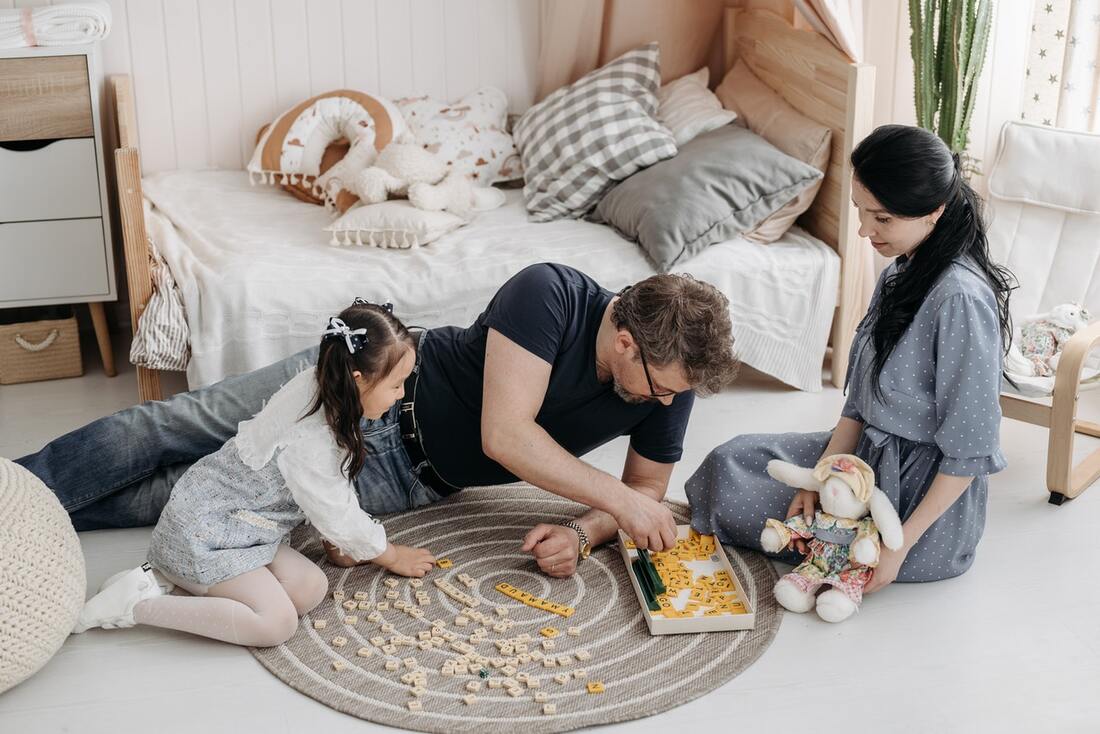|
Becoming a parent changes you in ways you can’t imagine, and most of those ways are for the better. You grow as a person, learn to put someone else’s needs ahead of your own and generally become more selfless. But becoming a parent also comes with some drawbacks, including sleepless nights and limited time to yourself. If you’re feeling like your new role as parent is taking up too much of your energy, you’re not alone. Many parents struggle with finding that balance between personal time and parental responsibilities. Fortunately, there are some easy ways to adjust without sacrificing your child’s best interests. Whether you’re feeling stuck or simply want to be an even better parent than you already are, here are some helpful tips on how to become the most supportive parent possible…
Create a support system If you find yourself feeling like you’re drowning in the role of parent, you should consider building a support system. Whether this is a group of friends, family members or a professional, having someone you can turn to in times of need will help you keep your own needs in mind. And remember: Your partner has just as much right to this support as you do. Consider the various kinds of support you need. Do you need help caring for your child? Do you need to talk about your feelings? Do you need some one-on-one time? Whatever it is, you deserve to get it. Find specific moments of solitude Sometimes, when you’re parenting you feel like you don’t have any time to yourself, let alone alone time. If you’re feeling harried, stressed or like you simply don’t have the energy to be a great parent, it’s important that you carve out some time to yourself. You don’t have to go all out and book a day trip to an exotic locale. You can simply sit quietly, read a book or meditate. As a parent, you need to be able to recharge your batteries, otherwise you’ll end up short-changing your child. There’s nothing wrong with having a bubble bath now and then. Cultivate your own interests It’s important that you don’t give up on hobbies and interests that are important to you. After all, what good is a parent who lacks identity? You can still be the parent you want to be and pursue the things that matter to you. Some of the best parents are people who have a rich and full life outside of their child. That said, you do have to be careful not to neglect your child. But cultivating your own interests helps you find your identity again, and your child will benefit from this. Set boundaries and don’t be a martyr One of the best ways to support your child is to set boundaries. This doesn’t mean you never do anything for your child. It means that you don’t do everything for them. Having a strong sense of self as a parent is important. If you’re constantly doing things for your child without saying no, they could grow up without knowing how to take care of themselves. Your child has to have a chance to be independent, so don’t be a martyr. Make sure that you have time to yourself, too. Take care of yourself physically and mentally You have to take good care of yourself physically to be a good parent. If you’re eating an unbalanced diet, the nutrients for growing a healthy baby may not be there. And you have to take good care of yourself mentally as well. It’s important that you have time to relax and unwind so you’re not stressing all the time. Make time for self-care, even if it’s a quick bubble bath or a 10-minute meditation. This also means that you don’t neglect any health issues that you may be experiencing. If you’re feeling anxious or depressed, don’t hesitate to get help. Becoming a parent is a profound event, and it will change you for the better. You will become more patient and selfless — as long as you remember to take care of yourself and your own needs, too. Don’t forget to create a support system and make time for yourself. This will help you stay balanced and enjoy your experience as a parent.
0 Comments
The challenges of raising kids are never-ending. Just when you think you’ve got things figured out, a new challenge pops up and throws everything into disarray. Parenting is hard, especially when you’re doing it alone, or perhaps for the first time as an adult. It takes strength and resilience to tackle these problems – and not just so you can see them as opportunities to grow. You might feel like everything is against you but trust us when we say that there are solutions to every problem. Here are some common parenting problems that every parent faces:
Communication breakdown Communication breakdown is one of the main reasons that relationships break down. The same goes for parenting – if you can’t communicate well with your child, you’ll struggle to raise them properly. There are several reasons why communication might break down between you and your child. Maybe you and your child speak different languages, or perhaps you’re from different cultures, which impacts how you communicate. Maybe your child has special needs that affect their ability to communicate. Or, you’re just not very good at communicating. If you want to improve your communication, there are a few things you can try. First, be aware of your own communication style. Are you an ‘action-oriented’ person or more of a ‘verbalizer’? If you’re not sure, there are personality tests online you can take to help identify your communication style. Once you know your style, you can try to adapt it to suit your child. Second, talk to your child. Really listen to them and have conversations with them. You can start by asking open-ended questions, like “What was the best thing that happened to you today?” Lack of sleep Sleep is not just something you do at night – it is a crucial part of your everyday life. You can’t function properly without it, which is why it is so important to establish good sleeping habits in your child from an early age. Parenting problems arise when you don’t get enough sleep and your child doesn’t get enough sleep either. There are many reasons why parents don’t get enough sleep. Perhaps you have a newborn, or you’re sleep-deprived due to continuous worrying. Whatever the reason, try to put some measures in place to combat this problem. Start by creating a sleep-friendly environment for your child. Remove any unnecessary distractions from their room, such as noisy toys and excess light. Be sure to create a predictable bedtime routine, where your child knows exactly what to expect every step of the way. Disciplining your child is hard Disciplining your child is a key part of parenting. It teaches them right from wrong and shapes them into responsible, capable individuals. But this is easier said than done. You have to walk a very fine line with discipline, especially when your child is young. If you discipline them too harshly, they will not learn anything from the experience. But if you don’t discipline your child enough, they could grow up to be very destructive individuals. Parenting problems arise when you can’t find the right balance between being overly strict and being too lenient with your child. There are many different methods of parenting, including the authoritarian method and the democratic method. Every parent has their own methods and preferences, and it’s important to remember that there’s no right or wrong way to do things. There is only what works for you and your family. Enforcing bedtime routines is equally hard Establishing bedtime routines is important, not only for your child’s mental and physical health but also for your sanity. When you have a baby, you’ll quickly learn that babies don’t operate on a schedule. When they’re hungry, they feed – when they’re tired, they sleep. It’s not like that for adults. We have to fit our lives around our schedules and appointments, and this is a skill that your child will have to learn too. This is where bedtime routines come in. They are a great way to instill a sense of routine and order in your child’s life and help them develop good sleeping habits from an early age. Parenting problems arise when you don’t enforce a bedtime routine. Whether your child is too young or old to have a bedtime routine, they need to learn how to manage their time. You can start by introducing a bedtime routine, even when your child is really young. This shows them what they need to do to get ready for bed, and will help them to associate their activities with sleep time. Your kid loves to cause trouble All parents have days where they feel like they’re constantly fighting with their child. These are the days where your child just loves to cause trouble. You can’t understand their motivations and they don’t seem to care that they are making things difficult for you. Parenting problems arise when your child has a bad attitude and doesn’t respect your authority as a parent. The best way to deal with a child with a bad attitude is to ignore it. You need to show your child that their behaviour is not acceptable. This can be difficult when your child is being particularly stubborn, but it is important that you try to stay calm and keep your cool. Be sure to set clear boundaries with your child and be consistent with your discipline. Parenting is hard work but it is incredibly rewarding. When you’re a parent, you’re not just responsible for your own happiness – you’re responsible for another human being. It’s a huge responsibility and can be overwhelming at times, but there are solutions to every problem. The important thing is to not give up. If you ever feel like you need a break, or that you’re struggling too much, remember that you are not alone. You can always reach out for help. When you're working from home, it can be tough to find time to spend with your kids. You're always busy and you never know when you'll have a break. But it's important to make time for your kids, even when you're busy. Here are some creative ways to spend time with them when you're working from home:
1. Take a break to play with them. Whenever you have a break, take the time to play with your kids. It doesn't matter if it's just for a few minutes. They'll appreciate the time you spend with them and it will help you relax and recharge. 2. Use your lunch break to spend time with them. If you have a long lunch break, use it to spend time with your kids. You can take them out for lunch or play a game with them. It's a great way to bond with them and have some fun. 3. Put aside some time each day to spend with them. Set aside some time each day, even if it's just for 30 minutes, to spend with your kids. You can read together, play a game, or just talk. It's important to have that daily connection with them. 4. Make time for a weekly activity with them. Plan a weekly activity that you can do with your kids, like going to the park or to the library. It's a great way to spend some quality time with them and it's something they'll look forward to each week. 5. Have a family movie night. Once a week, have a family movie night where you all watch a movie together. It's a great way to relax and spend some time together. You can even make it into a fun event by making popcorn and snacks. 6. Get creative with your time. There are endless possibilities for how you can spend time with your kids when you're working from home. Get creative and think of something that would be fun for both of you. 7. Have a picnic lunch. Pack a picnic lunch and eat it together in the park or in your backyard. It's a great way to spend some time outdoors and enjoy each other's company. 8. Go for a walk or bike ride together. Getting some fresh air is always a good idea. Go for a walk or a bike ride with your kids and explore your neighborhood. It's a great way to get some exercise and spend time together. 9. Cook a meal together. Cooking can be a fun activity to do with your kids. They can help you measure and mix ingredients, and it's a great way to teach them about food. Plus, you'll get to eat a delicious meal afterward! 10. Spend some time talking. It's important to keep the lines of communication open with your kids. Spend some time talking to them about their day, their thoughts, and their feelings. It will help you stay connected to them and understand what's going on in their lives. These are just a few ideas to get you started. The important thing is to make time for your kids and to be creative with how you spend that time. They'll appreciate it and it will make your relationship with them even stronger. Parenting can be one of the most rewarding experiences in life, but it can also be a lot of work. Many parents find that they have to change their lifestyle in order to accommodate for their new family.
Here are 5 ways to turn parenting into a lifestyle: 1. Make time for yourself. It is important to find time for yourself when you are a parent. This can be difficult, but it is necessary. Make sure to schedule some time each week to do something that you enjoy. This will help you stay sane and keep your energy up. 2. Set rules and stick to them. If you want your parenting to be a lifestyle, you need to set rules and stick to them. This will help your children know what is expected of them and help you maintain order in your home. 3. Get organized. Organization is key when you are a parent. You need to be able to keep track of your child’s schedule, your own schedule, and the family budget. This can be difficult, but it is necessary in order to stay on top of everything. If you can follow these three tips, you will be well on your way to turning parenting into a lifestyle. Just remember to take things one day at a time and don’t try to do too much all at once. Parenting is a marathon, not a sprint! 4. Take care of yourself physically and mentally. It is important to take care of yourself physically and mentally when you are a parent. This means eating healthy, exercising, and getting enough sleep. It also means taking time for yourself to relax and de-stress. If you are not taking care of yourself, you will not be able to take care of your children the way they need you to. 5. Connect with other parents It can be helpful to connect with other parents who are in the same stage of life as you. This can provide support, advice, and a sense of community. There are many ways to do this, such as joining a parenting group or online forum. By following these tips, you can turn parenting into a lifestyle that works for you and your family. Just remember to take things one day at a time and don’t try to do too much all at once. Parenting is a marathon, not a sprint! What are some other tips for turning parenting into a lifestyle? Share your thoughts in the comments below! If you enjoyed this post, please share it with your friends! And if you’re looking for more parenting tips and advice, be sure to check out the rest of our blog. Raising children is one of the most challenging tasks a person can undertake. Along with providing for their physical needs, it is important to teach them the right things so that they can grow up to be responsible and productive members of society. What should you teach your kids? That is a question that has been debated by parents and educators for centuries. In this blog post, we will discuss the most important things that every child should learn.
There are many different parenting styles, and there is no one right way to parent. The most important thing is to be consistent with your parenting approach and to make sure that your children feel loved and supported. Here are some of the most important things you should teach your kids: Respect: Teach your kids to respect themselves and others. This includes treating people with kindness, speaking to people politely, and being considerate of others' feelings. Responsibility: Help your kids to understand that they are responsible for their own actions and choices. Teach them to be accountable for their behavior and to think about the consequences of their actions. Independence: Encourage your kids to be independent thinkers and doers. Teach them how to make decisions for themselves and how to take responsibility for their own lives. Hard work: Show your kids the importance of hard work and perseverance. Help them to understand that nothing worth having comes easy and that success requires dedication and effort. Self-control: Teach your kids how to control their emotions and impulses. Help them to understand that it is okay to feel angry or frustrated, but that it is not okay to act out in negative ways. Teach them how to express their feelings in healthy ways. Kindness: Teach your kids to be kind to others, even when it is difficult. Help them to understand the importance of compassion and empathy. Show them how good it feels to help others and make the world a better place. Resilience: Teach your kids how to bounce back from setbacks and failures. Help them to understand that everyone makes mistakes and that it is okay to make mistakes. Teach them how to learn from their mistakes and keep going even when things are tough. Creativity: Encourage your kids to be creative and to use their imaginations. Help them to see the world in new and different ways. Show them that there is more than one way to solve a problem. Critical thinking: Teach your kids how to think critically and to question what they hear. Help them to understand that there is often more than one side to a story. Encourage them to research and find out the truth for themselves. Perseverance: Teach your kids the value of perseverance and determination. Help them to understand that it is important to never give up on themselves or their dreams. Show them how to keep going even when things are tough. These are all important qualities that every child should learn. What other qualities would you add to this list? Share your thoughts in the comments below! Parenting is one of the most rewarding experiences a person can have. There are many benefits to being a parent, both for the child and the parent themselves. In this blog post, we will discuss some of the reasons parenting is so important and why it's worth it!
One of the most important benefits of parenting is that it provides children with a sense of security. Parenting gives children someone to look up to and depend on. When parents are there for their children, it helps them feel safe and secure. This is especially important during the early years when children are learning about the world around them.
Parenting also helps children develop a strong sense of self-esteem. When parents show their children love and support, it helps them feel good about themselves. This is important because it can help children face challenges in life with confidence. A healthy sense of self-esteem can also lead to better mental and physical health as children grow older.
Parenting can also help prevent problems in the future. For example, children who have a strong relationship with their parents are less likely to engage in risky behaviors like drugs and alcohol. They are also more likely to do well in school and have successful careers. Parenting is an investment in the future!
Parenting is also a great way to bond with your children. When you spend time with your children and get to know them, it creates a special bond that can last a lifetime. This is one of the most rewarding aspects of parenting!
Parenting is a lot of work, but it's worth it! The benefits of parenting are numerous and valuable. If you're considering becoming a parent, don't hesitate to take the plunge! You won't regret it. Parenting is one of the most rewarding experiences you can have! Did you enjoy this blog post? Parenting is definitely a challenging yet rewarding experience. What are some of the benefits of parenting that you've experienced? Let us know in the comments below! And be sure to check out our other blog posts for more great content. Parenting can be a difficult task. There are so many things to worry about, and it seems like the list of challenges never ends. But don't worry, we are here to help! In this blog post, we will discuss 5 ways that you can make parenting easier for yourself. Follow these tips and you will be on your way to a more relaxed and stress-free parenting experience!
1. Establish a routine One of the best ways to make parenting easier is to establish a routine. Having a set schedule for activities, meals, and bedtimes can help reduce stress and keep everyone on track. When children know what to expect, they are more likely to cooperate and behave well. Plus, having a routine will give you some much-needed structure in your day-to-day life as a parent. 2. Set limits and be consistent It is important to set limits for your children and to be consistent with those limits. If you are constantly changing the rules, it will only confuse and frustrate your child. But if you are firm and consistent with your expectations, they will quickly learn what is expected of them. This will make parenting much easier in the long run! 3. Take breaks Parenting can be a lot of work, and it is important to take breaks when you need them. If you are feeling overwhelmed, take some time for yourself to relax and rejuvenate. You can also ask for help from family members or friends when you need a break. It is okay to admit that parenting is tough – we all need a little help sometimes! 4. Be patient Patience is a virtue, and it is especially important when parenting. Children learn and grow at their own pace, so try not to compare them to other kids their age. It is important to be patient with your child and to remember that they are still learning. If you can keep this in mind, parenting will be much easier (and more enjoyable) for both of you! 5. Enjoy the ride! parenting is a challenging but rewarding experience. It can be tough, but it is also full of love, laughter, and precious memories. Cherish these moments with your child, and try to relax and enjoy the ride. parenting is not always easy, but it is definitely worth it! By following these five pieces of advice, parents can make their lives much easier. From developing routines to setting limits to taking breaks, each suggestion helps parenting become more manageable. parenting is a difficult but rewarding experience and following these tips will help make it even more so. Thanks for reading! Did you find this blog post helpful? Let us know in the comments below! And be sure to check out our other blog posts for more great parenting advice. Parenting is extremely difficult, and anyone who tells you otherwise is likely still in the early stages of it. The pressure to be a perfect parent is real and constant, with seemingly everyone having an opinion on how to do it right. Parenting can be challenging for any adult, let alone one that is still learning about themselves as an adult. To make parenting easier and more enjoyable, there are simple steps that can bring greater happiness to your life as a parent. Even though becoming a happier parent may seem like an impossible task at times, anyone can achieve it with little effort. Here are some tips to become a happier parent:
Be grateful for your children One of the best ways to become a happier parent is to be grateful for your children. Think back to when you found out you were expecting and let that gratitude guide the way you parent. You have a child because you want to share your love and life with them, and raising them is an opportunity to learn to be a better version of yourself. If you're struggling with your child, try to find the gratitude for them in your situation. Is it because your child is trying to communicate that something is wrong that they need help with? Is it because your child is still growing and has moments of frustration? Is it because your child is a beginner and making mistakes as they learn what they need to know? Take care of yourself This might seem a bit strange to include in a list of ways to become a happier parent, but remember that you can only give what you have. If you're constantly pushing yourself to the brink and beyond, you will inevitably burn out. Plus, you won't be fully present for your children if you're too busy trying to catch up on sleep and rest. Take care of yourself by getting plenty of sleep, eating healthily, and finding time to do the things that bring you joy. Don't put yourself last on your list of priorities — you are just as important as anyone else in your life. If you are too exhausted to do your best for your children or your job, you can't be your best for anyone else. Don't compare yourself to other parents There will always be parents who have it all together, and there will always be parents who have it all wrong. Comparing yourself to others will lead to nothing but frustration, as each parent and child combination is different. No two parenting styles are exactly alike, and no two sets of parents are either. What worked for your best friend's child may not work for yours, and that's okay. Your child is theirs, and you are the parent to your child. Focus on yourself and your child, and don't worry about what other parents are doing. Practice self-care As mentioned above, taking care of yourself is important. This means finding ways to bring joy and relaxation into your daily life. If you have young children, this might include taking short breaks during the day to do something that you enjoy. It could be as simple as spending a few minutes reading a book or walking outside. Whereas sleep, food, and rest are important for everyone, these things are especially important for parents. Unfortunately, people who are responsible for children also have other responsibilities, like a job and household chores. While it's important to be present for your children, it's also important not to neglect yourself for their sake. Have healthy boundaries with your children Healthy boundaries are a crucial part of becoming a happier parent. It's important to know what your boundaries are, and to assert them with your children. This will show them how to set and respect boundaries for themselves in the future. Boundaries might include what you are and aren't willing to do for your child (such as not giving them money to buy things they don't need), or what you expect from your child (such as getting good grades in school). Be careful not to over-parent. If you have set healthy boundaries for yourself and your child continues to try to break those boundaries, then you may need to set some more strict boundaries. Becoming a happier parent can be challenging, but it's worth the effort. Your children are going to look back on their childhood, and they are going to remember how you parented. They will learn how to parent their own children by observing how you parent them, so it's important to do your best and to be a happy person while doing it. Parenting is a life-long journey, and it's important to remember to celebrate your wins and learn from your mistakes. Parenting can be incredibly rewarding, but it's also incredibly difficult. The sooner you learn to accept that, the sooner you can start to enjoy it for what it really is: the hardest and most rewarding job you'll ever have. Becoming a parent is one of the most humbling experiences in life. It’s a role that requires you to be responsible and accountable for another human being 24/7—no small feat! As challenging as it can be, there are many benefits to raising children from a young age. It will help them grow into an adult who is kinder, more generous and compassionate toward others. No matter what stage of life you’re in or how old your child is, it’s never too early or too late to positively influence their habits and actions as they grow up. Here are some ways you can raise responsible kids:
Be a role model Children are extremely perceptive and will notice your every move, good and bad. If they see you, their parent, being kind, compassionate and generous toward others, they’ll naturally follow your lead and do the same. If your child sees you swearing at the traffic, cutting others down with your words or being cruel in any way, they’ll likely pick up these habits as they grow older and become less aware of their impact. Similarly, if your child sees you being generous and giving back to the community, they’ll understand the importance of being a kind and compassionate person. Set clear boundaries and expectations Kids need boundaries and guidelines that they can depend on. When you set rules and expectations for them, you not only help them stay safe and thrive in society, you also teach them to be self-sufficient and accountable for their actions. This will come in handy as they grow older and need to navigate their way through school, work and life independently. When setting limits with your kids, it’s also important to let them know why you’re doing so. This will help them understand the bigger picture and have a better grasp on why the rules are in place. For example, if one of your rules is that your child can’t have a certain toy or item, explain why so they understand the reasoning behind the decision. Talk to your kids about money from an early age It can be a difficult topic to broach, but talking to your kids about money is important, especially if your household earns an income. The sooner you start having these conversations with your child, the better. Even if they are very young and don’t fully comprehend what you’re saying, they will be able to pick up on your emotions. If you talk about money with a nervous or anxious tone, they’ll pick up on that. However, if you discuss it with a calm and reassuring voice, they will be able to draw strength and comfort from your words. For example, if you have savings goals or a mortgage, you can explain to your child why it’s important to contribute toward these. This will help them understand their place in the family and why it’s important for them to pitch in as well. Help them develop healthy habits Kids are curious little beings who are constantly learning and growing. As they get older, it’s important for them to develop positive habits that will help them thrive as an adult. Besides things such as getting enough sleep, eating a healthy diet and exercising, there are other habits that are equally important to cultivate in your child. For example, it’s essential to teach your kids to be honest and compassionate toward others. This will help them avoid worrying about being caught. Being honest will also help them feel good about themselves and avoid feeling guilty or ashamed if they accidentally break a rule or fib. Celebrate their milestones, no matter how small Kids are full of excitement and ready to explore and experience life, whether they’re 3 or 13 years old. It’s easy to get caught up in the daily grind and forget to celebrate the little things your child accomplishes, such as learning a new skill or completing their homework on time. If you are able to celebrate the small milestones in your child’s life, you will help them feel loved and appreciated, which is very important as they are growing up. This will also help build a strong, positive relationship between you and your child. By celebrating their successes, you are helping your child feel good about themselves and, in turn, they will feel confident and proud of what they’ve accomplished, which is a very important part of growing up. Becoming a parent is a life-changing experience that requires a lot of hard work and dedication. It will be challenging at times, but the rewards are so worth it. Raising responsible kids is a journey that begins when they are still in the womb. From the moment they are born, you have a chance to positively influence them and help them grow into an adult who is kind, generous and compassionate toward others. No matter what stage of life you’re in or how old your child is, it’s never too early or too late to start positively influencing their habits and actions as they grow up. Today’s children are tomorrow’s leaders. They learn by example, and they will copy what they see. As their parent, you have the power to influence your kids in a positive way. If you want your children to grow up and lead a healthy life as an adult, it starts at home. From the food you serve them to the activities you introduce them to, everything has an impact. Here are some tips on how you can create a healthy home for your kids.
Change your habits to set a good example While you have control over what your children eat and do, you also have control over your own habits. If you’re the type of person who eats tons of junk food, drinks soda, and smokes cigarettes, your children will likely follow your example. If you want to set a good example for your children, you should first take a look at your own habits. Stop eating unhealthy foods, and drink water instead of soda. Stop smoking, and use e-cigarettes instead if you can’t stop completely. These small changes will help you set a good example for your kids. When your children see you making healthy choices, they will likely follow your example. Have dinner together as a family If you want to set a healthy example for your kids, you should have dinner together as a family. You should eat the same food your children do because this will help you set a healthy example. If you want to make family dinners a healthy experience, you should buy fresh food and avoid processed meals. Fresh fruits and vegetables are good sources of vitamins, proteins, and minerals. You should plan your family dinners and make sure you have the right food items on the menu. You should also have regular family dinners because this will help you bond with your children. Having dinner together will give you and your children time to relax and enjoy each other’s company. Don’t serve your child too much screen time If your child is under the age of 2, you should avoid screen time. If your child is 2 to 5 years old, you should limit screen time and make sure it doesn’t interfere with your child’s daily activities. If you want to raise a healthy child, you should avoid too much screen time. Children who grow up with too much screen time are at risk of having attention issues, delayed development, and behavioral problems. When your child spends too much time in front of a screen, it interferes with their daily activities such as reading, playing outside, and sleeping. If you want to raise a healthy child, you should avoid too much screen time. Make sure you have a clean home When you have toddlers and infants, you have to clean your home on a regular basis because they are messy. When you have school-aged children, you need to clean your home on a regular basis because they are messy. If you want to raise healthy children, you should make sure your home is clean. You should vacuum your home regularly, and you should do all the other cleaning tasks on a regular basis. If your children are young, you should hire a cleaning service so you can focus on raising your children. If your children are school-aged, you should make cleaning a family activity so everyone pitches in. Get your child to exercise If you want to raise a healthy child, you should get your child to exercise. Newborns, infants, toddlers, school-aged children, and teens should exercise regularly. When your child is young, you should take them to a daycare center that promotes exercise. When your child is school-aged, you should sign them up for extracurricular activities that include physical activity. When your child is a teen, you should encourage them to participate in extracurricular activities. If your teens are too old to participate in extracurricular activities, you should encourage them to exercise at home. If you want to raise a healthy child, you should get your child to exercise regularly. Encourage your child to eat healthy foods If you want to raise a healthy child, you should encourage your child to eat healthy foods. You should feed your child a balanced diet that includes a mixture of proteins, carbohydrates, vitamins, and minerals. When your child is young, you should feed them a baby diet. A baby diet includes foods such as breast milk and formula, fruits, vegetables, and grains. If your child is school-aged, you should feed them a healthy diet that includes protein, carbohydrates, vitamins, and minerals. When your child is a teen, you should encourage them to eat a balanced diet because they are likely to be picky eaters. If you want to raise a healthy child, you should encourage them to eat healthy foods. Don’t forget to have fun as a family When you are raising children, you have to remember to have fun as a family. When you are too busy trying to make your children healthy, you might forget to have fun as a family. If your children are young, you should take them on family outings. When your children are school-aged, you should take them on family outings and encourage them to do things together as a family. When your children are teens, you should encourage them to spend time with you and their siblings. You should also organize family events so you can have fun as a family. If you want to raise a healthy family, you should remember to have fun as a family. Parenting is not an easy task, and it can be even harder when you have to consider your children’s health. These tips can help you create a healthy home for your children, and the best part is that it doesn’t have to be difficult. As a parent, you have so many responsibilities that demand your time and energy. It often seems as if there’s not enough of either to go around. As a result, it can feel almost impossible to balance the various needs of both your personal life and your parental one. Parenting isn’t easy – but it doesn’t have to be so hard either. If you are feeling like you need help in this area, here are 7 habits of highly effective parents that you can begin implementing today.
Establish routines Routines are not only helpful for children with special needs, they can benefit all kids in many ways. If you have a child who has special needs, having a daily routine can help you meet those special needs, but it can also help you to minimize meltdowns and other issues that come with the spectrum. If you have a child without special needs, routines can also be helpful because they help to create a sense of predictability and stability in your child’s life. This can help to reduce anxiety as well as improve focus and attention span, especially during times of high stress, like during standardized testing or when a sibling is being born. Routines can also be helpful because they can help you save time, whether it’s during the school day or with extracurricular activities. Be present and listen As a parent, you’re busy and have a lot going on. You’re probably trying to balance a career, caring for your children, and maintaining a social life. When you have so many responsibilities, it can be easy to let your child go unnoticed. This is especially true when your child is a young toddler who doesn’t yet know how to communicate his needs. There are so many opportunities to be present and attentive to your child. Instead of rushing through your child’s day, try to slow things down just a bit and really listen to what he has to say. If you’re rushing to get your child out the door, try to take a couple of minutes to slow things down again when you arrive at school. Don’t sweat the small stuff Parenting is hard and stressful, and it’s easy to let the small things add up over time. You might be tired, stressed, or frustrated, and small issues might seem like a big deal. You might be dealing with anxiety as a parent, and these small issues might be making you feel even more anxious. To help combat the stress of parenting, don’t sweat the small stuff. If your child spilled his milk on the table, let it go. If he forgot to put his shoes on before leaving the house, don’t make a big deal out of it. If your child does something on purpose, such as breaking something or not doing his or her chores, then definitely address it. However, if it’s just a small, unimportant thing, just let it go. Discipline with love, not anger One of the most important habits of a highly effective parent is discipline. Unfortunately, many parents associate discipline with punishment and sometimes even physical punishment. However, discipline is much more than punishment. Discipline is about teaching your child how to make good decisions, follow the rules, and treat others with respect. It’s also about helping your child to feel safe, secure, and loved. When disciplining your child, try to stay calm and use positive, encouraging language. Avoid using language that will make your child feel ashamed, angry, or afraid. If you’re disciplining your child out of anger, you’re doing it wrong. Make time for yourself It’s important that you take care of yourself, both physically and emotionally. Your child will learn how to take care of himself as he gets older, but in the meantime, it’s important that you take care of yourself. There are many ways that you can take care of yourself as a parent. You might choose to take a yoga class or attend a weekly meditation group. Maybe you prefer taking a walk in the park or reading a book. Once you have children, it’s easy for your social life to disappear. However, you need to make time for yourself and your friends. You might want to arrange for some help at home so that you can meet up with your friends for dinner or even go on a date every now and then. Help your child develop self-discipline Learning how to be self-disciplined isn’t something that typically happens overnight. It’s a skill that your child will need to use throughout their entire lifetime. If your child is still very young, there are some things that you can do to help him or her develop self-discipline. Once your child is old enough to understand the concept of money, start giving them a weekly allowance. The amount you give them doesn’t have to be extravagant, but it should cover the cost of their extracurricular activities, birthday gifts for their friends, and small things such as ice cream or comic books. Make sure that your child pays you back for the money they spend. Take care of your own physical health One of the best things that you can do for yourself as a parent is to take care of your own physical health. Eat healthy foods, exercise regularly, and get plenty of sleep. When you’re healthy in terms of physical fitness, it’s easier to cope with the stress of parenting. Your physical health also impacts your mental health. For example, if you don’t get enough sleep, you’re more likely to suffer from anxiety. If you eat too much sugar and drink too much caffeine, you’re at an increased risk for mood disorders such as depression. Parenting is a challenging but rewarding endeavor. As your children grow and develop, it’s important to continue to learn new ways to support them and nurture them in a helpful and healthy way. As a parent, you may feel like you don’t have enough time or energy to get everything done. However, if you implement these habits of highly effective parents, you’ll be well on your way to a more stress-free, happy life as a parent. As a parent, there are many ways you can help your child grow into a happy, smart, and successful adult. Parenting is challenging at times but with the right strategies you can be an effective parent. Parents invest their time, energy and resources in their children to ultimately improve their lives and set them up for success. While parenting is a natural instinct for most parents, it’s important to have the right strategies in place to optimize your parenting efforts. Great parents create an environment where their kids feel safe, loved, and secure so that they have the best chance of growing into healthy adults. Parenting can be extremely stressful at times but it doesn’t have to be that way. If you’re looking for ways to be a better parent, these six techniques can help you be an effective dad or mom:
Establish a Strong Coaching Culture Effective coaching is critical to a successful parenting strategy. When you view parenting as a coaching process, it helps you approach your child with a growth mindset and empowers you as a parent. A growth mindset is characterized by a belief that your ability to succeed in life is not dependent on your genetics or luck but on your own effort, skills, and desire to learn and improve. When you view parenting as a coaching process, you can create a culture where your child feels safe enough to explore, make mistakes, and be curious. A coaching culture encourages your child to explore their interests, ask questions, and try new things. If your child has a coach mentality, they’ll feel empowered to explore their interests, take calculated risks, and ask for help when needed. Set Clear Expectations Building strong relationships with your child starts with having clear expectations from the beginning. It’s important to set expectations for how you want your child to behave, what you want them to do, and how you want them to treat others. When disciplining your child, it’s important to be specific about what expectations you’re trying to enforce. By clearly setting expectations, you communicate to your child that you care about their well-being and want to see them succeed. Building strong relationships with your child is a long-term investment. By setting expectations early on, you increase your chances of successfully helping your child grow into a happy and healthy adult. Provide Consequences When Needed All children need boundaries. However, not all kids respond well to the same parenting strategies. What’s important is to find a strategy that works for your child. If your child is struggling to meet expectations, it’s important to have a consequence in place for when they fail. Effective consequences are neither too harsh nor too light. By giving your child a consequence for failing to meet expectations, you send a message that their actions have consequences in the real world. A consequence should be designed to correct your child’s mistake and be preventative. It should also be timely and have a foreseeable end. Giving your child a consequence sends the message that they have the ability to affect their own lives. It’s also important to make sure your child understands why they’re receiving the consequence. Help Your Child Develop Self-Discipline Self-discipline is the ability to regulate your thoughts, emotions, and actions. It’s an extremely valuable skill that can help your child build better relationships, be more successful, and be happier in life. Regardless of your child’s age, you can help them develop self-discipline. One of the best ways to do this is by modeling self-discipline yourself as a parent. By showing your child how to regulate their thoughts, emotions, and actions, you can help them develop self-discipline. In addition to modeling self-discipline, you can also help your child develop self-discipline by offering them structure and providing them with the tools they need to succeed. Help Your Child Build Relationships Skills Strong relationships are one of the most important parts of successful parenting. However, it’s not something that happens naturally. It’s important to actively teach your child how to build strong relationships, practice empathy, and use communication skills when necessary. You can do this in many different ways, such as by reading books together, taking them to social events, and talking with them about their day. By actively teaching your child how to build relationships, you can help them develop the skills they need to succeed in life and have positive relationships. Help Your Child Build Their Confidence One of the most important things you can do as a parent is help your child build confidence. Confidence is one of the most important factors in determining someone’s success in life. By staying positive, praising your child for their accomplishments, and empowering them to try new things, you can help your child develop their confidence. By praising your child for their positive attributes, challenging them to do their best, and showing your child gratitude, you empower them to build their confidence. By empowering your child to try new things and have new experiences, you help them build their confidence by accepting and embracing their mistakes. Parenting is a challenging but rewarding job. By following these seven techniques, you can be an effective parent and help your child grow into a successful adult. It takes a lot of time and energy to raise a child. It’s important to remember that you’re not alone in this journey. There are many people that you can turn to for advice and support. Whether it’s talking with your partner about how you each approach parenting, joining and attending parenting groups, or connecting with other parents online, there are many ways you can get support during this process. As a parent, it’s your job to lead them in the right direction and set a good example for them. They are going to look up to you for guidance, love and support. Parenting isn’t easy as it sounds. It can be quite challenging even for the best of us. It is not about checking off a list of things but rather a journey filled with ups and downs. In order to become an excellent parent, you need to understand your child first before doing anything else. Know who they are as individuals and their needs as an individual person before thinking of parenting techniques or strategies to raise them well-adjusted adults one day. As much as there are many ways on how you can nurture your kid into a wonderful adult, here are seven simple tips that could help you get started:
Establish a strong relationship with your child. The key to raising beautiful and healthy kids is having a strong relationship with them. Yes, you need to be a good listener and have a hands-on approach when necessary, but first and foremost, you need to have a strong relationship with your own children. There are a lot of ways you can do this. One of the best ways to do this is by listening to your children. Sit them down and ask them about their day, things that happened to them, what they learned and what they want to achieve in life. This shows them that you are there for them when they need you. When your child is young, you can read them bedtime stories. As they grow older, you can ask them to read to you. This is a great way to have them express themselves and share their thoughts and feelings with you. Don’t try to be your child’s best friend. You will not be able to raise your child into a well-adjusted adult if you try to be their best friend. You need to understand that you are their parent and not their friend. They need you to be their guide, support system, and someone they can look up to. There are times when you need to scold your child or punish them for their misbehavior, even if they are your child. You should know how to draw the line and set boundaries for your child. You don’t want to be too quiet and reserved or let them get too close for comfort, but you also don’t want to be overly friendly with them and let them cross the boundaries you set for them. Be friendly but maintain a certain level of distance. Let them know that you are someone they can depend on but not their best friend. Be present. Listen and understand. Being present with your child means listening to them when they talk and not just hearing the words they are saying. Just because they are adults doesn’t mean they don’t need your guidance and support. Being present also means understanding their needs and what they are going through. If they are struggling with something, ask them if they need help. If they are going through a rough patch in life, be available to them and walk them through. Help them discover their passion, talent and unique gifts. As a parent, it is your job to help them discover their passion in life. You don’t want to impose your dreams on your child and make them pursue what you want them to. Instead, you want to help them discover their own talents and gifts in life. If you notice that your child loves to play with toys meant for younger children, you can ask them why they like playing with those toys. You may find out that they want to be a teacher when they grow up. If you notice that your child likes drawing or writing stories, you can help them develop their talent. Let them pursue what they love doing and encourage them to keep pursuing their dreams in life. Be firm but not Heavy-handed when needed. You don’t want to be too hard on your child, but you also don’t want to spoil them. You need to understand that being hard on your child is not the same as being mean. You need to have firm boundaries and set rules for your child. Let them know what is acceptable and what is not. This is how they will learn to respect themselves and others. Let them know that you love them and care for them, but at the same time, you can’t let them do whatever they want to do. You need to be able to draw the line for them and not let them cross those lines. Offer unconditional love and support. As a parent, it is your job to support your child through thick and thin. Let them know that whatever they are going through is okay and that you are there for them. You don’t have to have the perfect life or be the perfect parent for your child to love and respect you. They need to know that you love them no matter what. When they make mistakes, let them know that they can always learn from their mistakes. Help them understand that making mistakes is not the end of the world. Let them know that they can learn to pick themselves up again if they ever fall. Be a role model Kids learn most of their life skills from their parents. If you want to raise your child into a wonderful adult, you need to set the right example for them. You don’t have to be a perfect parent, but you need to be an excellent one. You need to lead by example. If you want your child to be kind, you need to be kind to others. If you want them to be generous, you need to be generous to others as well. If you want to raise a child who is responsible, resourceful, confident, and creative, you need to be those things too. You need to lead by example because your child is always watching you. They are always taking note of the things you do and the things you say. Parents take the typical approach of making their kids do things. They pick them up, cook them a special dinner, and give them plenty of attention. But in actuality, parents do more than that. Parenting actually has a strong impact on one’s mental health. Not only is it hard to imagine not having our kids around to help us through life’s ups and downs we also don’t want to see them suffer from any kind of illness or problem. If anything, we want to ensure that they are happy and healthy! However, parenting does have its drawbacks as well. Parents who are too nurturing often overreact which can point towards other areas of parenting being problematic. Wrong or right? Let’s take a look at what we know about the effects of parenting on children’s mental health. What Are the Effects of Parenting on Children’s Mental Health? Over time, parents are found to be more attentive, encouraging, and protective in their children. They are also likely to have a greater sense of empathy and understanding. Parents, on the other hand, are likely to be stubborn, impatient, and often judgmental. As a result, children may experience difficulty regulating their emotions, gain negative feedback (such as “bad things” or “bad ideas”), and engage in unhelpful behavior. Additionally, they may experience self-esteem and confidence loss. Parenting can also have a positive impact on many other areas of children’s life, including academic performance and reading, math, writing, and physical health. A large body of research supports the notion that parental warmth, empathy, and helpfulness are beneficial for children’s mental health. Why Does parenting Have a Mental Health Impact?
“We need to teach our kids to say no, to mean no, and to love no.” This is what adolescents who practice parenting say they feel. The rest is pretty much bull. We have to remember, though, that parenting is a lot lessTeenagers do not need to be told no. The only time they should be saying “no” is when they are genuinely and completely sure they are making the best choice for themselves and their child. Kids also need to remember that parents are not always available to help them. In fact, it’s pretty rare for a parent to be available for more than a few hours at a time. Instead, they should be expected to pick up the slack when the other parent is out not just for a few hours, but for the entire day. What Can Parents Do to Protect Their Child’s Mental Health? There are a few things that parents can do to protect their child’s mental health. Parents can:
As parents, it is our job to connect with our kids and help them grow into happy and successful adults. However, this can be a difficult task at times. Luckily, there are many different tips and techniques that can help make the process a bit easier. In this blog post, we will discuss 10 of the best tips for parents to connect with their children!
If you want to connect with your children and help them grow into happy and successful adults, here are some tips that can help: 1. Get to know your child’s interests and passions. One of the best ways to connect with your children is to get to know their interests and passions. What are they interested in? What do they enjoy doing? By learning more about the things that matter to them, you will be better able to connect with them on a deeper level. Plus, when you share common interests with your children, it can make spending time together even more enjoyable! 2. Make time for your children. In today’s busy world, it can be difficult to find time to spend with our children. However, it is important to make the effort to do so. When we make time for our kids, it sends them the message that they are important to us and that we value them. One way to make sure you are spending enough time with your children is to schedule regular “dates” with them. This can be something as simple as going out for ice cream once a week or taking a trip to the park on the weekends. Whatever you do, just make sure you are focusing on quality time together. 3. Be present when you are with your children. It is not enough to simply be in the same room as your children. When you are spending time with them, it is important to be present and engaged. This means putting away your phone, turning off the TV, and really focusing on your child. Make eye contact, ask them questions about their day, and really listen to their answers. By being present with your children, you will deepen the connection you share. 4. Avoid using electronics as a babysitter. It can be tempting to plop our kids in front of the TV or hand them a tablet when we need a break. However, this is not beneficial for our children or our relationship with them. Instead of using electronics as a babysitter, try to find other ways to occupy their time. There are plenty of great toys, books, and games that can entertain and engage children of all ages. Plus, by playing with your children, you will be able to bond with them while they have fun! 5. Be patient with your children. Patience is a virtue, especially when it comes to parenting. Children can be frustrating at times, but it is important to remember that they are still learning and growing. If we get angry or frustrated with them, it will only make the situation worse. Instead of losing your patience, try to take a deep breath and understand where your child is coming from. This can help you respond in a more calm and constructive manner. 6. Show your children how much you love them. One of the best ways to connect with your children is to show them how much you love and care for them. This can be done in many different ways, such as hugging and kissing them, telling them you love them, or simply spending time with them. 7. Encourage your children to express their feelings. It is important for children to feel like they can express their emotions freely. When they are feeling happy, sad, or angry, encourage them to tell you about it. This will help you better understand your child and how they are feeling. Plus, by allowing your children to express their feelings, you will deepen the connection between you. 8. Teach your children about empathy. Empathy is the ability to understand and share the feelings of others. It is an important skill for parents to teach their children. When our kids learn empathy, it helps them to see things from other people’s perspectives and to be more understanding and compassionate. One way to teach empathy is to model it yourself. Whenever you are dealing with a difficult situation, take the time to explain how you are feeling and why. This will help your children learn how to express their own emotions in a healthy way. Another great way to encourage empathy in your children is through books and stories. There are many wonderful books that teach kids about different emotions and how to deal with them. Reading these stories together can help to foster empathy and understanding in your children. 9. Be a good role model for your children. One of the best ways to connect with your children is to be a good role model for them. Show them how to be kind, respectful, and responsible. Let them see you making healthy choices and living a life that you are proud of. When our kids see us living our best lives, it sets a positive example for them and helps them to understand what is important to them. Plus, it deepens the connection between us because they know that we are working hard to be the best parents we can be. 10. Have realistic expectations for your children. It is important to have realistic expectations for our children. They are still learning and growing, so we need to give them the time and space to do so. If we expect too much from them, it will only lead to frustration and disappointment. Instead, try to focus on the positive aspects of your child’s development. This will help you to see their progress and achievements, which will deepen the connection between you. Parenting can be a challenging but rewarding experience. By following these tips, you can deepen the connection between you and your children. This will help to create a strong and healthy relationship that will last a lifetime. As a parent, you want your child to be successful in life. But how can you make sure this happens? There is no one-size-fits-all answer to this question, as every child is different. However, there are some general parenting tips that can help you raise a successful child. In this blog post, we will discuss 10 of these tips. Keep reading for helpful advice! 1. Be a role model for your child. One of the best ways to encourage your child to be successful is by setting a good example yourself. Show them that it’s important to work hard and never give up on your dreams. Let them see you pursuing your own goals and aspirations. This will inspire them to do the same in their own lives. 2. Encourage them to try new things. Successful people are often those who are willing to take risks and step outside their comfort zone. Help your child develop this trait by encouraging them to try new things. It’s okay if they don’t always succeed at first – the important thing is that they learn to keep trying. 3. Teach them the value of hard work. Hard work is essential for success in any area of life. Teach your child that nothing worth having comes easy. Help them develop a strong work ethic and instill in them the importance of always giving their best effort. 4. Help them develop a positive attitude. A positive attitude is another important ingredient for success. Teach your child to look on the bright side of things and to never give up, even when times are tough. Show them that a positive outlook can make all the difference in achieving their goals. 5. Encourage them to set goals. Successful people often have specific goals that they are working towards. Help your child develop this habit by encouraging them to set goals for themselves. Whether it’s a short-term goal or a long-term dream, having something to strive for will help motivate them to achieve their best. 6. Teach them to be resilient.
Resilience is an important quality for anyone seeking success. Life will always have its ups and downs, but it’s how you deal with the tough times that really matter. Teach your child to never give up, even when things get tough. Help them develop a strong sense of self-belief and show them that they can overcome anything if they just keep going. 7. Help them develop good study habits. One of the best things you can do for your child’s future success is to help them develop good study habits. Teach them how to focus and stay on task, even when they don’t feel like it. Show them that a little hard work now will pay off in the long run. 8. Encourage them to be creative. Creativity is another important quality for success. Encourage your child to tap into their creative side and express themselves in unique ways. Help them explore their interests and find new ways to express themselves. Who knows – they may just discover a hidden talent! 9. Help them learn to handle failure. Nobody achieves success without experiencing some setbacks along the way. Help your child learn to deal with failure in a healthy way. Teach them that it’s okay to make mistakes – what matters most is how you learn from them and keep going. 10. Encourage them to enjoy the journey. Success is not a destination – it’s a journey. Help your child enjoy the process of working towards their goals and dreams. Teach them to savor the small victories along the way and to never lose sight of what’s really important. By following these tips, you can give your child a strong foundation for success in life. Just remember that every child is different, so don’t be afraid to tailor these tips to fit your unique parenting style. With a little love and guidance, you can help your child reach their full potential! Becoming a parent is one of the most rewarding experiences in life, but it can also be challenging. There are so many things to learn and do when you're a new parent, it can be hard to know where to start! In this blog post, we will outline 10 tips that will help make your journey as a new parent a little bit easier.
Becoming a parent is both an amazing and daunting experience. Luckily, there are many things you can do to ease the transition into parenthood. Here are our top ten tips: 1. Get plenty of rest when you can – both you and your partner will need it! There's no denying that being a parent is a lot of work. You'll be up at all hours of the night caring for your new baby, and you'll probably be pretty exhausted during the day. That's why it's important to get as much rest as you can when you can. When your baby is sleeping, take the opportunity to catch some sleep too. If possible, try to take turns with your partner so that each of you gets some uninterrupted sleep. And don't forget to ask for help from family and friends when you need it! 2. Breastfeeding can be tough in the beginning, but it's so worth it! Breastfeeding is one of the best things you can do for your baby, but it can be a challenge in the early days. You may experience some pain and soreness, and it can be difficult to get your baby to latch on correctly. Stick with it – breastfeeding is worth all the effort! If you're struggling, there are plenty of resources available to help you (including lactation consultants, support groups, and online forums). And remember – every parent makes mistakes. You're not expected to be perfect! Just do the best you can and ask for help when you need it. Parenting is a rewarding but challenging journey – enjoy it! 3. Take some time for yourself – you deserve it! Being a parent is a full-time job, and it's important to take some time for yourself every now and then. Whether it's getting a manicure, going for a run, or just taking a few minutes to relax with a cup of coffee, make sure to schedule some "me" time into your week. You'll be a better parent if you're taking care of yourself too! 4. Get out of the house – both you and your baby will benefit from some fresh air! It can be tempting to stay home all the time when you have a new baby, but getting out of the house is good for both you and your little one. Fresh air and Vitamin D are great for your health, and socializing with other parents can be a huge help. So take a walk around the block, visit a nearby park, or go on a coffee date with a friend – just make sure to leave the house every once in a while! 5. Join a parent support group – you're not in this alone! Parenting can be tough, and it's always nice to have some support. There are parent support groups available both online and in-person, so find one that works for you. You'll be able to share your concerns, ask questions, and make new friends who are going through the same thing as you. 6. Keep a baby journal – it's a great way to document all the special moments! A baby journal is a wonderful way to keep track of all the precious moments during your child's first year (and beyond!). You can write down things like your baby's first words, favorite foods, and milestones reached. You'll also be able to look back on these memories and cherish them for years to come. 7. Don't be afraid to ask for help – you can't do it all! Asking for help is not a sign of weakness – it's a sign of wisdom. You can't possibly do everything on your own, so don't be afraid to reach out to your family and friends when you need some assistance. Whether it's watching the baby while you take a shower or bringing over a hot meal, let people know how they can help you out. 8. Invest in a good baby carrier – it's worth the money! A baby carrier is an essential piece of gear for any parent. It allows you to keep your hands free while still being able to cuddle and bond with your little one. Look for a carrier that is comfortable, adjustable, and easy to use. Your back will thank you! 9. Make time for your partner – parenting is a team effort! It's important to remember that you're not in this alone. Parenting is a team effort, and it's crucial to make time for your partner. Whether it's going on date nights or just taking a few minutes to talk about your day, maintaining a strong relationship with your partner is essential. 10. Enjoy the ride – it goes by so fast! Before you know it, your baby will be all grown up. So savor every moment, whether it's good or bad. These early years are special and fleeting, so treasure them as best you can. Parenting is a rewarding but challenging journey – enjoy it! Thanks for reading! I hope these tips were helpful for you. Do you have any other suggestions for new parents? Please share in the comments below! |
Read More
All
|




















 RSS Feed
RSS Feed